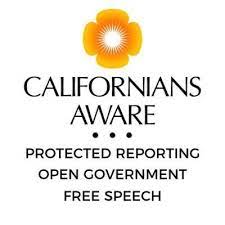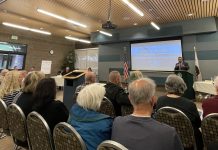Even as Malibu attorney Kevin Shenkman readies his lawsuit against the Cypress Council regarding alleged violations of the California Voting Rights Act, another group has filed a lawsuit against the city alleging violations off the Ralph M. Brown Act by excessive use of closed session to keep the resulting districting discussions away from public view.
The lawsuit was filed May 16 in Superior Court by attorneys Kelly A. Aviles and Shaila Nathu on behalf of Californians Aware, a statewide nonprofit organization that promotes government transparency.
Since Shenkman’s initial letter in September of 2021, the Cypress City Council has yet to hold a formal discussion of the matter in public session, instead holding a series of “closed sessions” in private to discuss how to respond.
In March, the city finally responded to Shenkman, rejecting the allegations of CVRA violations, refusing to entertain any serious discussion of switching to district-based elections.
While Shenkman said last week he is preparing a lawsuit against the city to force compliance with the CVRA, CalAware has now filed suit in protest of the lack of transparency the city council displayed in handling those discussions.
On April 14, CalAware sent a “demand” letter to the city, citing the Brown Act violations, therefore asking the Council to rescind any actions taken that occurred within meetings they allege were not legal, including the March 14 rejection of Shenkman’s demand made on behalf of the Southwest Voter Registration Education Project.
In his response to the CalAware demand letter, Cypress city attorney Fred Galante wrote that “the demand incorrectly alleges that the city council must meet in closed session to first determine whether the Shenkman demand was a proper subject of closed session.”
Galante said the law permits the city to meet in closed session when “based on the advice of its legal counsel, holding a closed session to confer with, or receive advice from its legal counsel regarding pending litigation.”
Galante provided a six-page detailed response to the CalAware demand letter, saying CalAware’s allegation “ignores the clear threat of litigation in the Shenkman letter. The city was permitted to receive legal advice and consider the merits of the Shenkman Demand.”
Galante uses similar arguments to refute each point of the April 29 CalAware demand letter.
“Although the Brown Act does separately provide a basis for meeting in closed session to determine whether the Shenkman Letter is a proper subject of a closed session due to potential litigation, it does not require that this step be taken first. As you are aware, this is the exact purpose of the March 14 closed session item.”
With the lawsuit, however, a judge will now determine whether or not Cypress has violated the Brown Act by engaging in its string of nonpublic discussions over the issue.
The petition filed in Superior Court claims “the Brown Act prohibits City Council from conducting closed sessions, unless the closed sessions are specifically permitted. Pursuant to both the Brown Act and Article I, Section 3(b) of the California Constitution, the specific exceptions to the Brown Act’s open-meetings requirements must be construed narrowly.
Moreover, “there is no provision in the Brown Act which provides for any closed session to discuss the form of elections. By discussing this topic of wide public concern and impact in closed sessions, City Council has violated Government Code section 54962.”
Further, the petition claims that because the city’s attorney [Galante] has already stated the city is not in violation if the Brown Act, the citizens will continue to be deprived of information they have a right to hear without judicial intervention.
“Because legal counsel for the City has stated that the City Council’s prior actions did not constitute violations of the Brown Act, it is likely the City Council will continue to violate the Brown Act in the future,” the petition states.
In addition, the petition quotes sections of the state’s constitution that specifically deals with the public’s right to know.
“The people have the right to instruct their representatives, petition government for redress of grievances, and assemble freely to consult for the common good,” the petition claims.
Also, among the citations, the petition states “the people have the right of access to information concerning the conduct of the people’s business, and, therefore, the meetings of public bodies and the writings of public officials and agencies shall be open to public scrutiny.”
Further the “petitioner requests a judicial determination that Respondent has violated the Brown Act in connection with the City Council’s actions taken at March 14, 2022 meeting. This determination is necessary and proper because Respondent refuses to conform to the requirements of the Brown Act and future violations are likely to continue to without judicial intervention.”
The group claims in the petition that it has “exhausted” all administrative remedies and only judicial action will halt the alleged violations.
In the petition, CalAware is asking the court to issue a Writ of Mandate to force the Cypress Council to adhere to the Brown Act’s open meeting requirements.
“It is the intent of the law that [the] actions [of local public agencies] be taken openly and that their deliberations be conducted openly,” the petition states.
“The Cypress City Council violated the Brown Act by discussing, deliberating, and taking action on the form of City Council elections, in closed session in violation of Government Code,” the petition states in summary, and therefore, “the action taken at its March 14, 2022 meeting, including the vote to maintain at-large elections for the City Council, is null and void.”
Further, the petition asks the court to: “(a) prevent the City of Cypress from violating the Brown Act by discussing, deliberating, and taking action on substantive policy issues in closed session under the guise of anticipated litigation; and (b) tape record all closed sessions for a period of three years.”
Further, the group is asking for reimbursement of legal fees and asks for any “further relief as the court deems just and proper.”
Galante said Tuesday that the city has yet to be served with the lawsuit so he could not comment. But, he said, if the allegations are the same as in the demand letter, the city’s responses are likely to be the same as well.












